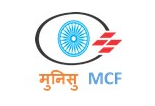Master Control Facility
The Heart of Indian Geo-Synchronous Satellite System
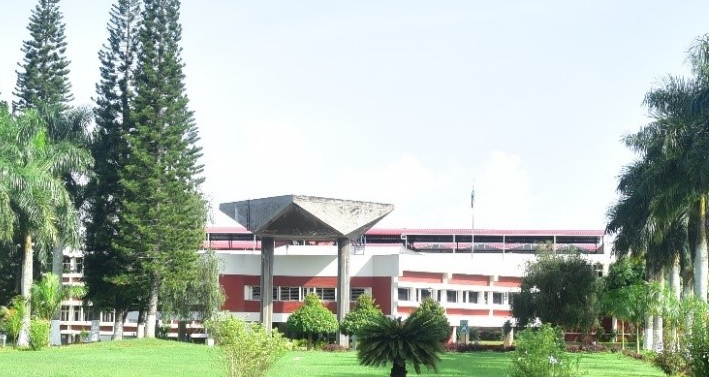
Master Control Facility (MCF) at Hassan in Karnataka and Bhopal in Madhya Pradesh monitors and controls all the Geostationary / Geosynchronous satellites of ISRO, namely, INSAT, GSAT, EOS, CMS and IRNSS series of satellites. MCF provides overall radio visibility coverage extending from Persian Gulf in the West to Australia in the East, a geo-arc of 150 degrees which makes it ideal control center in South Asian Region.
MCF has the expertise in operations of Indian Geosynchronous Space assets for Communication, Navigation and Metrological Payloads. All these geosynchronous satellites are being monitored, operated and maintained in the desired orbit.
Our Capabilities
Multi-Satellite Operations
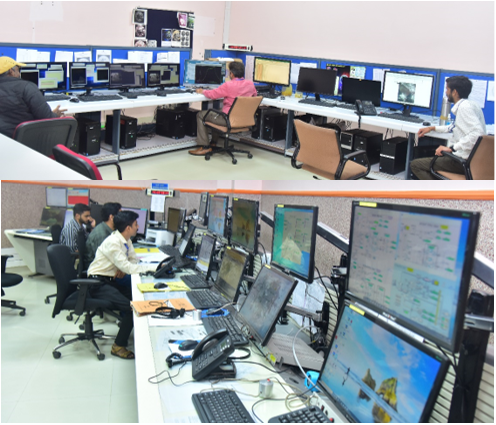
MCF is responsible for spacecraft operations starting from Launch and Early Orbit Phase (LEOP) of geosynchronous & IRNSS class of spacecraft, capable of Orbit Raising of spacecraft, that are injected into the Geosynchronous Transfer Orbit (GTO) or sub-GTO by the launch vehicle, In-Orbit Testing (IOT) of communication payloads operating in multiple frequency bands, meteorological, navigational and science payloads and subsequent On-Orbit Operations. MCF has the capability to handle operations for Dual launches and dual injection of spacecraft.
MCF activities include round-the-clock Tracking, Telemetry & Commanding (TT&C) operations, and special operations like Eclipse management, Station-keeping maneuvers and Recovery actions in case of contingencies. MCF interacts with User Agencies for effective utilization of the satellite payloads and to minimize the service disturbances.
It also takes care of decommissioning of spacecraft to grave yard orbit towards the End -Of -life. To carry out these operations effectively, MCF Hassan is having an Integrated Facility consisting of Spacecraft Control Centers, Launch Control Center, Mission Computer Network and TTC &R Ground Network of Satellite Control Earth Stations & Antennas.
The life cycle of a Geo-Stationary Satellite consists of three distinct phases:
- Initial Phase (LEOP)
- On-orbit Phase (Normal Phase)
- End of Life phase (EOL)
MCF activities include:
-
Round-the-clock Operations
Satellite health monitoring and control, Station keeping maneuvers, Eclipse Management, Spacecraft Contingency management, -
Flight Dynamics Activities
Initial Phase Orbit-Raising, Orbit maintenance & Colocation management, Space Situational Awareness (SSA) activities for avoiding collision with space debris, Orbital Repositioning, Re-orbiting and De-commissioning of satellite at the End-Of-Life (EOL). -
Telemetry, Tracking, Commanding and Ranging (TTC&R) & User-Services
In-Orbit Testing (IOT) of payloads, User-services Support, Payload Interference Resolution & Geo-location of Interfering Source -
Satellite Data Processing
Satellite Telemetry Data Acquisition, Processing & Storage
Telemetry, Tracking, Commanding and Ranging & Network
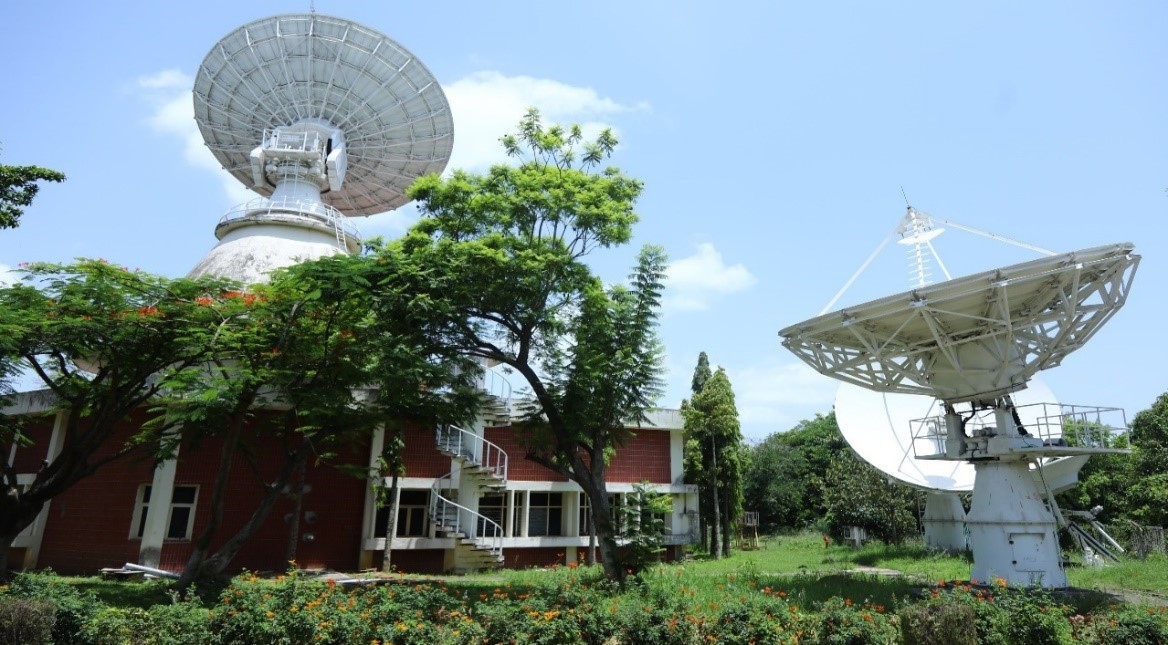
An integrated facility of ten numbers of Satellite Control Earth Stations (SCES) consisting of Full Motion Antennae (FMA) and Limited Motion Antennae/Full Coverage Antenna (LMA) /FCA) at Hassan and three Satellite Control Earth Stations consisting of FMAs & LMA/FCAs at Bhopal, carry out the operations in coordination.
Satellite Control Earth Stations (SCES) operating in C-band, Ku-Band & Ext C-Band, provide TTC&R support for the in-orbit satellites. During the LEOP support, MCF facilitates a global TTC&R network using Earth Stations at Hassan, Bhopal and hired stations at other parts of the globe. Capability to support TTC operations of Co-located Satellites using single antenna terminal has facilitated efficient utilization of ground hardware. Payload Support and In-Orbit Testing (IOT) of payloads in UHF, L, S, C, Ext-C, Ku and Ka bands are facilitated by MCF. High Throughput Satellites like GSAT-19 & GSAT-11 operations are facilitated with required ground-based beacon stations network.
Satellite Control Center

Spacecraft Control Center (SSC) facilitates monitoring and control for all Spacecraft. The operations carried out from here are, Health Monitoring, Attitude Maintenance, Orbit and co-location Management, Eclipse Management, Contingency Handling, Payload Management, Performance Evaluation, Trend Analysis, Balance Propellant Estimation, Solar Power Degradation Estimation, Space Weather monitoring and alert etc.
SCC is equipped with world standard software applications for commanding, telemetry monitoring, Real time graphics with state of art hardware and accessories.
LEOP Control Center (LCC)-Hassan
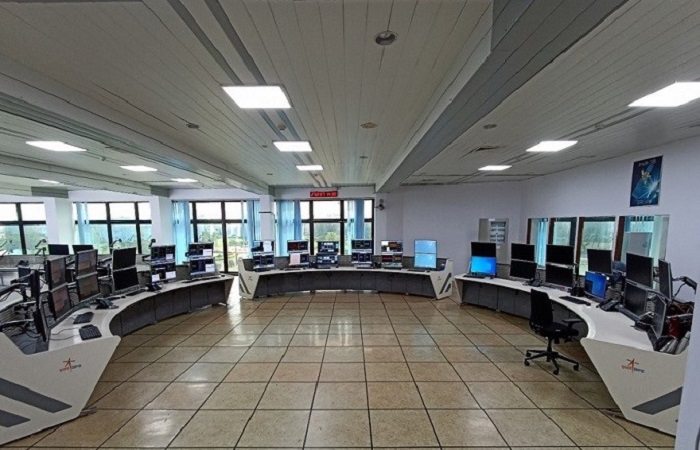
LEOP Control Center (LCC) supports all initial phase operations after launch. The LEOP infrastructure has been reorganized for taking up Dual Launch capability by augmenting the facilities for Mission Control, Ground support and Network stations support
Initial elliptical orbit after ejection from launch vehicle is made circular with orbit raising operations of at least three Apogee Motor Firings. These operations will be followed by Solar Panel and antenna reflectors deployment as per the mission requirement, three-axis stabilization & station acquisition maneuvers to position spacecraft at designated orbital slot.
Satellite Data Processing - Mission Computer Network

Mission Computer Systems are heart of MCF where all spacecraft data is collected, processed and distributed to clients at different operations areas spreading across MCF on real time as well as offline basis through a dedicated Mission network.
Mission computer systems are configured in server-client architecture over TCP/IP network. Normally two setups of server configured for collecting same spacecraft data where one setup is called prime chain and another setup is called backup chain. If anyone chain server is down for any reason still data is available to second chain server and clients.
The key elements in the mission network are compute server, file server, Network Attached Storage and Client workstations.
Mission network is deployed across MCF in star topology through which all the computer systems are interconnected. The main back
Facility for In-Orbit Testing (IOT) of Payloads

MCF is the nodal center for In-orbit Testing (IOT) of all GSO/GEO spacecraft payloads. IOT of satellite payloads is carried out after launch to check out the payload systems, subsequent to the launch of the spacecraft and to assess the key performance parameters to serve as reference for the entire lifetime of the payload. Executed In-Orbit Testing Projects for all INSAT/ GSAT and IRNSS satellites
- Testing Communication, Navigation & Meteorological payloads
- Automated test set-up to provide highly accurate test results
- Flexibility for project specific enhancements
- Facilities to carry out IOT for UHF, L, S, C, Ext-C, Ku and Ka Band
- Station calibration and Satellite database creation
- Time-line based In-Orbit Test Plan generation & timely execution
Interference Monitoring & Geolocation Facility
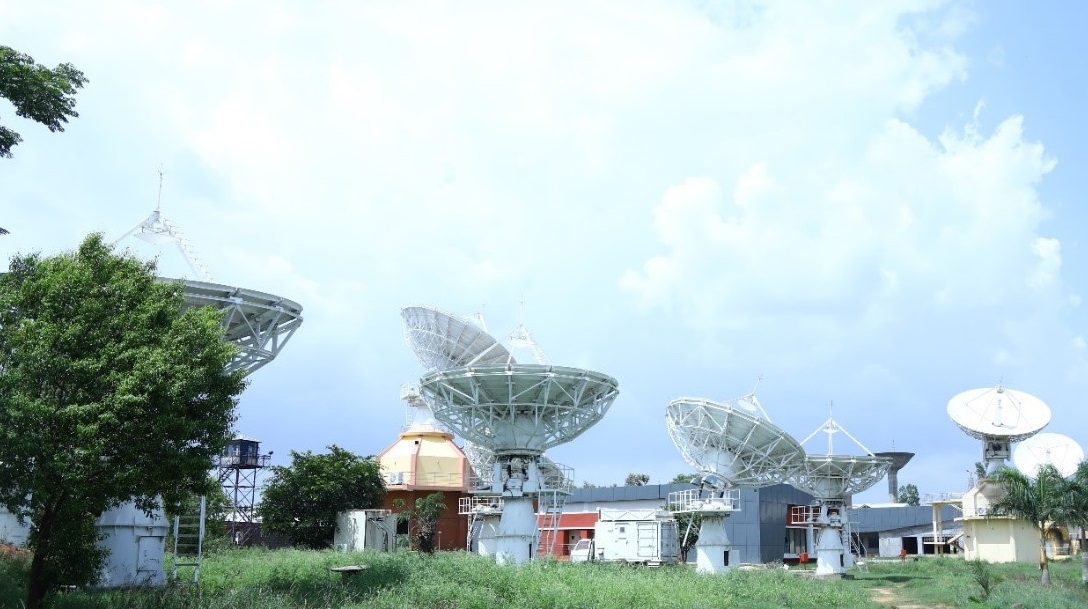
MCF co-ordinates for user support activities like service activation, service migration, benchmarking of uplink levels, user terminal optimization and communication link optimization. MCF is having a full-fledged carrier, interference monitoring and geo-location facility
Facility have monitoring features like frequency, bandwidth and power violations, cross-pol interference, carrier-ID, carrier under carrier, transponder operating point etc.
Using this advanced facility and technical expertise here at MCF, interference issues among users are resolved on priority basis for satisfactory user operations.
This facility is also used for Interference Survey and subsequent co-ordination for important launch activities like LEOP, AMF and drift orbit operations.
Special Facilities
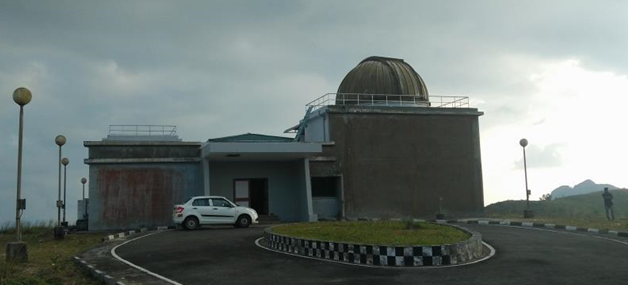
SPROC Facilities (Satellite Photometry, Laser Ranging and Optical Communication) for operating Optical Telescopes at Ponmudi (Kerala) and Mt. Abu (Rajasthan) are established to improve Space Situation Awareness (SSA) of the in-orbit satellites. A third-location ranging station is being established at NESAC, Shillong to improve the positioning accuracy of the in-orbit spacecraft by an order of magnitude.
Mission Analysis Room (MAR)
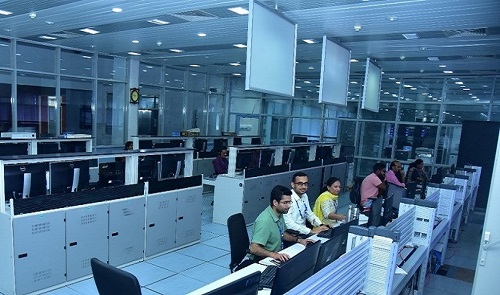
MAR facilitates pre and post analysis of the mission data by dedicated team of subsystem engineers who analyze system performance / health and take necessary actions as per requirement including planned operations and anomalies. Trend analysis is carried out to understand the behavior of each element of subsystem with statistical methods with comprehensive data of all the present and past missions using state of art analysis tools.


